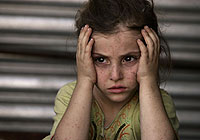 Young people in the Middle East pay the price of war
Young people in the Middle East pay the price of war8 August 2006
From UNICEF e-news
Omer, 15, lives in Haifa, northern Israel. “After the siren we have about a minute to get into shelters,” she says. “It’s kind of scary.”
Chloe, 19, lives in Beirut, the capital of Lebanon. “It’s really changed here,” she says. “You see the fear in people’s eyes. Shops are closed, the streets are empty.”
Julie, 16, lives in Gaza, in the occupied Palestinian territory. “We always hear the planes shelling and throwing rockets,” she says. “We hear the fighting all the time.”
In recent conversations with UNICEF Radio, these three young people – and others from their respective communities – painted a picture of constant trauma caused by the current violence in the Middle East. As armed hostilities continue, the region’s children are paying the price of war:
In Lebanon, more than 900,000 people who have been displaced since fighting between Hezbollah and Israel began on 12 July; an estimated 45 per cent of them are children.
In the occupied Palestinian territory, 37 children were killed in July alone.
In northern Israel, children live in danger and fear as a result of daily rocket attacks.
Although the fighting is preventing humanitarian agencies from reaching people in need – especially in southern Lebanon – some emergency supplies and services have been delivered:
In Beirut, UNICEF and key partners have begun a measles immunization campaign targeting displaced children.
As the lead UN agency for water and sanitation in Lebanon, UNICEF is also providing water bladders and water trucking capacity.
In Gaza, UNICEF is supporting psychosocial counselling sessions to help children cope with their fear and distress.
But much more help is needed to protect the lives, health and well-being of children caught in the conflict.
“The situation is grave and deteriorating rather rapidly,” said UNICEF Director of Emergency Programmes Dan Toole, who visited the Middle East last week. “Children are cut off. Families are cut off. Many, many people are without assistance, without food, without water.”
Mr. Toole added that UNICEF is appealing to donor countries for financial support.
“So far we have a lot of promises of funding and very little cash,” he said. “We can’t buy supplies with promises. We need that cash quickly so that we can move forward and supply the equipment, training and personnel that are needed to help children.”
